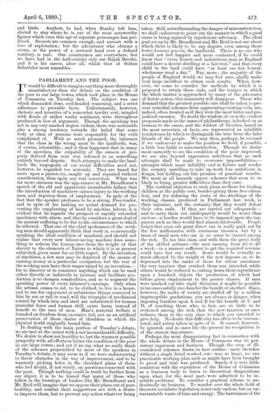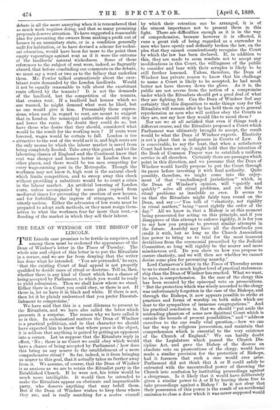PARLIAMENT AND THE POOR.
IT would be difficult to imagine anything more thoroughly unsatisfactory than the debate on the condition of the poor in our large towns, which took place in the House of Commons on Tuesday last. The subject was one which demanded close, cool-headed reasoning, and a strict adherence to provable facts. Unfortunately, however, rhetoric and invective of a somewhat tawdry sort, mingled with floods of rather washy sentiment, were throughout produced in lieu of argument. Though the speaking was not in any very marked degree violent, there was noticeable also a strong tendency towards the belief that some body or class of persons were responsible for the evils complained of. With so much premised, the inference that the class in the wrong must be the landlords, was, of course, irresistible ; and it thus happened that in many of the speeches, the culpability of the owners of pro- perty derived from rent was referred to as something entirely beyond dispute. Such attempts to make the land- lords the scapegoats of our social difficulties need not, however, be regarded too seriously. They are based far more upon a parrot-cry, caught up and repeated without consideration, than upon any real conviction. What was far more ominous was the appearance in Mr. Broadhurst's speech of the old and apparently ineradicable fallacy that the introduction of machinery causes injury to the working men, and deprives them of employment. In spite of the fact that the speaker professes to be a strong Free-trader, and in spite of his making no actual demand for pre- venting the supplanting of hand by machine labour, it is evident that he regards the prospect of rapidly extended machinery with alarm, and that he considers a great deal of the present suffering to be due to the circumstance to which he referred. That one of the chief spokesmen of the work- ing men should apparently think that work is, economically speaking, the ideal condition of mankind, and should not realise that every new labour-saving machine does some- thing to redeem the human race from the weight of that slavery to the elements of Nature to which it is at present subjected, gives cause for no little regret. By the invention of machines, a few men may be deprived of the means of earning money at a particular occupation, but the rest of the working men have their wages raised by an invention,— for to discover or to construct anything which can be used either directly or indirectly to increase and facilitate pro- duction is to cheapen commodities, and so to augment the spending power of every labourer's earnings. Only when the artisan ceases to eat, to be clothed, to live in a house, and to use for enjoyment or subsistence things conveyed to him by sea or rail or road, will the triumphs of mechanical science by which iron and steel are substituted for human muscular force and human skill, cause harm instead of benefit to the race of men. Man's material welfare is founded on freedom from excessive toil, not on an artificial preservation of those chains of thraldom in which the physical world originally bound him. In dealing with the main portion of Tuesday's debate, we are met at the outset with a not inconsiderable difficulty. We desire to show not hostility to, but the warmest possible sympathy with, all efforts to better the condition of the poor in our large towns ; and yet if we say what we really think of the schemes propounded by most of the speakers in Tuesday's debate, it may seem as if we were endeavouring to throw obstacles in the way of improvement, and to be wantonly picking holes in the cherished plans of those who feel deeply, if not wisely, on questions connected with the poor. Though nothing could in truth be further from our object, it is to be feared that many of those who follow in the footsteps of leaders like Mr. Broadhurst and Mr. Reid will imagine that we oppose their plans out of pure hostility, and combat their suggestions not with a desire to improve them, but to prevent any action whatever being taken. Still, notwithstanding the danger of misconstruction, we shall endeavour to point out the manner in which a good cause is being injured by injudicious advocacy. The ideal goal set up by Mr. Broadhurst and Mr. Reid is not one about which there is likely to be any dispute even among those hostes humani generic, the landlords. There is no one who would not feel happier and more contented, if he could know that " every honest and industrious man in England could have a decent dwelling at a fair rent," and that every child in the land could. have " at least one hot, honest, wholesome meal a day." Nay, more ; the majority of the people of England would, we may feel sure, gladly make very large sacrifices to obtain such results. When, how- ever, we come to consider the methods by which it is proposed to attain these ends, and the temper in which the whole matter is approached by many of the advocates of heroic action, this unanimity will disappear. Those who demand that the greatest possible care shall be taken to pre- vent remedial schemes from aggravating existing evils, are, indeed, often treated as if they were the most bitter and pre- judiced enemies. To doubt the wisdom of even the crudest proposals made in the name of philanthropy, is looked on as treason to the cause, and the wildest of theories, based on the most uncertain of facts, are represented as infallible touchstones by which to distinguish the true from the false friends of the people. We may then, perhaps, be excused if we endeavour to make the position we hold, if possible,. a little less liable to misconstruction. Though we desire, most earnestly to see the condition of the poor improved, we are also beyond expression solicitous that no rash attempts shall be made to overcome impossibilities,— attempts which must infallibly end in failure and render the country unwilling to take up work less ambitious in design, but holding out fair promise of practical results. We must at all hazards oppose schemes that seem to us likely to bring greater difficulties than they cure. The cardinal objection to such plans as those for feeding- children at the public cost, besides giving them free educa- tion, and for reducing the rents of the dwellings of the working classes, produced in Parliament last week, is their injustice, and the certainty that they would defeat their own ends. If they are carried out adequately— and to carry them out inadequately would be worse than useless—a burden would have to be.imposed upon the tax- payers such as they would find almost intolerable. People forget that even our great direct tax is really paid, not by the few millionaires with enormous incomes, but by a mass of small men who can in no sense be classed among the rich. To tax this class, and with them the great body of the skilled artisans—the men earning from £3 to a week—in a manner sufficient to get the required revenue could have but one result. Some would be actually so much affected by the weight of the new imposts as to be depressed into the ranks of those for whose assistance the very taxation that crushed them was intended, while others would be reduced to cutting down their expenditure upon a hundred objects the production of which had before given employment to the poorer classes. If men were marked out into rigid divisions, it might be possible to tax successfully one class for the benefit of another. Since, however, the ranks of society are shaded off by a million imperceptible gradations, you are always in danger, when imposing burdens upon A and B for the benefit of C and D, of touching those who, in fact, are so little to be reckoned among the rich, that the new taxation at once reduces them to the very class to which you intended to- give help. No doubt this difficulty has often to be encoun- tered, and action taken in spite of it. It cannot, however, be ignored, and in cases like the present its recognition is. of the utmost importance. Perhaps the most disappointing fact in connection with the whole debate in the House of Commons was its per- sistent vagueness and haziness. Though the crop of ill- considered schemes drawn in bare outline—mere sketches without a single detail worked out—was so large, no one practicable working plan such as might have been brought to proof and trial was produced. Surely it is very little consistent with the reputation of the House of Commons as a business body to listen to theoretical disquisitions upon what, for the most part, were admitted to be in- soluble problems. To consider a practical scheme is un- doubtedly its business. To wander over the whole field of theoretic socialistic legislation is not only useless, but an un-. warrantable waste of time and energy. The barrenness of the debate is all the more annoying when it is remembered that so much work requires doing, and that so many promising proposals deserve attention. To have suggested a reasonable plan for preventing the owners from making a profit out of houses in an unsanitary state, or in a condition generally unfit for habitation, or to have devised a scheme for techni- cal education, would have been far more to the point than empty vapourings against rent as if it were the outcome of the landlords' natural wickedness. Some of these references to the subject of rent were, indeed, so flagrantly absurd, that before concluding our comments on the debate, we must say a word or two as to the fallacy that underlies them. Mr. Fowler talked sententiously about the exor- bitant rents demanded by the London landlords. Would it not be equally reasonable to talk about the exorbitant rents offered by the tenants ? It is not the demands of the landlord, but the competition of the tenants, that creates rent. If a landlord had houses which no one wanted, he might demand what rent he liked, but no one would give it him. Presumably these expres- sions, when used in regard to rent, are meant to suggest that in London the municipal authorities should step in and lower the rents. No doubt they could do so, but have those who desire that they should, considered what would be the result for the working men ? If rents were lowered, wages would be certain to fall. London is too • attractive to the rest of the world as it is, and high rents are the only means by which the labour market is saved from being completely flooded. Take away this guard, and let the labouring classes of England and the Continent know that rent was cheaper and houses better in London than in other places, and there would be ten men competing for every wage-earning post in the Metropolis. Though the workmen may not know it, high rent is the natural check which limits competition, and to sweep away this check without providing a substitute would be to court a crisis in the labour market. An artificial lowering of London rents, unless accompanied by some plan copied from mediaeval times for preventing the erection of new houses, and for forbidding the ingress of strangers, would be utterly useless. Either the advocates of low rents must be prepared to adopt such methods, or they must resign them- selves to what the workmen fear far more than rent,—a flooding of the market in which they sell their labour.



































 Previous page
Previous page